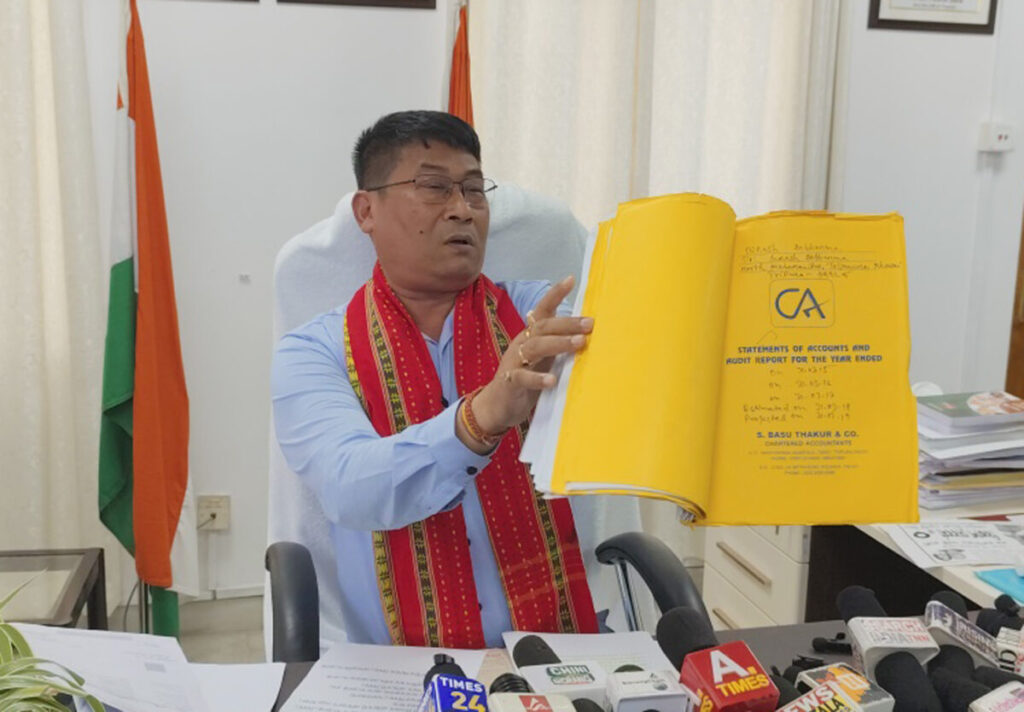Tripura Tribal Welfare Minister Bikash Debbarma recently threw down the gauntlet to Congress MLA Sudip Roy Barman, challenging him to prove the corruption allegations made against him. In a bold move, Debbarma vowed to resign from politics entirely if the accusations were substantiated. This dramatic exchange took place following the latest state assembly session, where Barman accused Debbarma of being involved in corrupt practices related to the Tribal Welfare Department.
Bikash Debbarma did not mince words in his rebuttal. He called on Sudip Roy Barman to produce concrete evidence within two days to back up the claims of corruption. With confidence, Debbarma asserted that the accusations were baseless and politically motivated. He maintained that his track record in the Tribal Welfare Department had been transparent and beyond reproach. His challenge to Barman was meant to silence critics and reaffirm his commitment to public service.
The minister’s stern challenge has sparked widespread discussion in political circles and the media. Observers note that such a public dare is rare in Indian politics, where allegations often fly without substantial follow-up. By offering to resign from his political career if proven guilty, Debbarma seems to be sending a strong message that he has nothing to hide. He has stated that his administration’s work in uplifting tribal communities in the state has been effective and above board.
Barman, on the other hand, stands by his claims. During the assembly session, he alleged that the Tribal Welfare Department had been mishandling funds meant for development projects and welfare schemes for indigenous communities. He accused Debbarma of either turning a blind eye to these practices or being directly involved in siphoning off funds. Barman emphasized that the mismanagement of resources had affected the very people the department was meant to serve, thus exacerbating tribal distress in rural areas.
As expected, Barman’s allegations have created ripples. The Congress MLA has gained the support of some opposition members who have echoed his concerns about the governance in Tripura. For them, Barman’s accusations align with a broader narrative of corruption and inefficiency in the state administration. They argue that the tribal welfare schemes have not yielded the desired results and that accountability is long overdue.
However, Debbarma’s response has shifted the conversation, placing the burden of proof squarely on Barman’s shoulders. Political analysts suggest that this counter-challenge could prove to be a clever tactic to deflect attention from the allegations. By taking such an assertive stance, Debbarma is effectively framing the situation in his favor, showing confidence that there is no incriminating evidence to be found. The two-day deadline, he has set for Barman, adds urgency to the drama, intensifying the pressure on the Congress leader to produce evidence quickly.
The fallout from this confrontation could be significant for both politicians. If Barman fails to provide evidence within the given time frame, he may find his credibility called into question. For Debbarma, successfully countering the allegations would bolster his political standing, particularly among his constituents. His challenge has been seen by many as a demonstration of his resolve and readiness to defend his reputation, which could work in his favor in the long run.
On the other hand, if Barman manages to gather compelling evidence, Debbarma’s promise to resign could change the political landscape in Tripura. The Tribal Welfare Minister’s exit from politics would create a leadership vacuum in the ministry, leading to potential upheaval within the ruling party. Moreover, it would give the opposition a major victory and add fuel to their broader campaign against the state government.
As the clock ticks on Barman’s two-day deadline, both politicians are gearing up for what could be a defining moment in their careers. The political tension in Tripura has reached a new high, with the public eagerly awaiting the outcome of this high-stakes challenge. Whatever the result, this confrontation is likely to have lasting repercussions for both Debbarma and Barman, and could influence the broader trajectory of Tripura’s political landscape.

